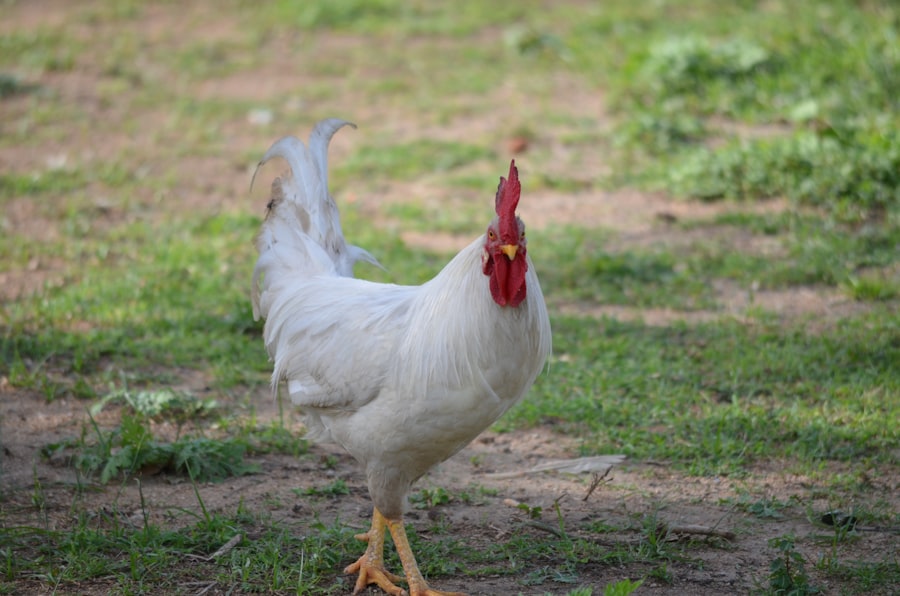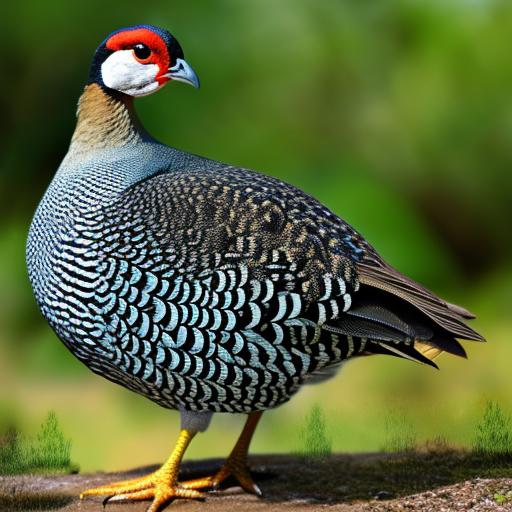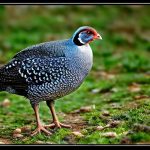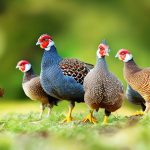Guinea fowl are social birds that thrive in a flock environment. They are highly active and curious, constantly foraging and exploring their surroundings. Understanding their natural behavior is crucial for providing them with a suitable living environment. Guinea fowl are known to be excellent foragers, and they spend a significant amount of time searching for insects, seeds, and other small creatures. They are also very vocal birds, using their distinctive calls to communicate with each other and to alert the flock of potential dangers. Additionally, guinea fowl are known to be quite skittish and easily startled, so it’s important to create a calm and secure environment for them.
Guinea fowl also have a strong instinct to roost in trees or high places at night for protection from predators. This behavior should be taken into consideration when designing their shelter. Understanding their natural instincts and behaviors will help you create an environment that meets their needs and allows them to thrive.
Key Takeaways
- Guinea fowl are social birds that thrive in groups and have a strong flocking instinct
- Providing adequate space and shelter is crucial for the well-being of guinea fowl
- Minimizing stress factors such as loud noises and overcrowding is important for the health of guinea fowl
- Creating a quiet environment can help guinea fowl feel safe and secure
- Using positive reinforcement training can help in managing and handling guinea fowl effectively
- Providing enrichment and distractions can prevent boredom and encourage natural behaviors in guinea fowl
- Seeking professional advice if necessary can help in addressing any specific concerns or issues with guinea fowl
Providing Adequate Space and Shelter
Guinea fowl require ample space to roam and forage, as well as a secure shelter to protect them from predators and the elements. When it comes to space, a general rule of thumb is to provide at least 3-4 square feet per bird in the coop and 250-400 square feet per bird in the outdoor run. This will allow them to move around freely and engage in their natural behaviors without feeling cramped or stressed.
Their shelter should be well-ventilated, predator-proof, and provide roosting space for them to perch at night. It’s also important to provide nesting boxes for them to lay their eggs. The shelter should be designed with their natural instincts in mind, such as providing elevated roosting areas to mimic their preference for high perches. Additionally, the shelter should be kept clean and dry to prevent the spread of disease and parasites.
Minimizing Stress Factors
Guinea fowl are sensitive birds that can easily become stressed in certain situations. It’s important to minimize stress factors in their environment to ensure their well-being. One common stressor for guinea fowl is overcrowding. When birds are crowded together, they can become aggressive towards each other and may exhibit abnormal behaviors. Providing adequate space for them to move around freely and establish their own territories can help reduce stress.
Another stress factor for guinea fowl is excessive noise or sudden loud sounds. Guinea fowl are easily startled, so it’s important to keep their environment as quiet as possible. This can be achieved by locating their shelter away from noisy areas and minimizing loud activities around them. Additionally, introducing new birds or changing their environment too abruptly can also cause stress. It’s important to introduce new birds gradually and make any changes to their environment slowly to allow them to adjust without becoming stressed.
Creating a Quiet Environment
Guinea fowl are easily startled by loud noises and sudden movements, so creating a quiet environment for them is essential for their well-being. This can be achieved by locating their shelter away from noisy areas such as machinery, traffic, or barking dogs. Additionally, it’s important to minimize loud activities around them, especially during their resting times.
Another way to create a quiet environment for guinea fowl is by providing them with visual barriers within their living space. This can be done by using shrubs, trees, or other structures to create secluded areas where they can retreat if they feel threatened or stressed. Providing them with a sense of privacy and security can help reduce their stress levels and allow them to feel more at ease in their environment.
Using Positive Reinforcement Training
Positive reinforcement training can be a valuable tool for managing guinea fowl behavior and building a positive relationship with them. This training method involves rewarding desired behaviors with treats or praise, which encourages the birds to repeat those behaviors in the future. For example, if you want your guinea fowl to return to the coop at night, you can use treats to reward them when they do so voluntarily.
Positive reinforcement training can also be used to teach guinea fowl to come when called, to tolerate handling, or to engage in other desired behaviors. It’s important to be patient and consistent when using this training method, as it may take time for the birds to understand what is expected of them. By using positive reinforcement training, you can build trust with your guinea fowl and encourage them to behave in a way that is beneficial for both them and their caregivers.
Providing Enrichment and Distractions

Guinea fowl are highly active birds that thrive on mental and physical stimulation. Providing them with enrichment and distractions can help prevent boredom and reduce stress in their environment. This can be achieved by providing them with objects to peck at, such as hanging vegetables or a bale of straw, which can keep them occupied and engaged.
Another way to provide enrichment for guinea fowl is by allowing them access to a varied outdoor environment where they can forage and explore. This can include providing them with access to different types of terrain, such as grassy areas, wooded areas, or open fields, which can provide them with opportunities for natural behaviors such as dust bathing and scratching.
Seeking Professional Advice if Necessary
If you are experiencing challenges with managing guinea fowl behavior or creating a suitable living environment for them, it may be beneficial to seek professional advice from a veterinarian or an experienced poultry keeper. A professional can provide guidance on managing specific behavioral issues, such as aggression or excessive vocalization, and offer recommendations for improving their living conditions.
Additionally, seeking professional advice can be beneficial if you are new to keeping guinea fowl and are unsure about how to meet their specific needs. A professional can provide valuable insights into guinea fowl behavior and care requirements, which can help you create an environment that allows them to thrive. By seeking professional advice when necessary, you can ensure that you are providing the best possible care for your guinea fowl and addressing any challenges that may arise.
Looking for ways to keep your guinea fowl quiet? Check out this insightful article on PoultryWizard about creating a peaceful environment for your guinea fowl. It offers valuable tips and techniques to help minimize noise and maintain a serene atmosphere. For more helpful poultry-related articles, visit PoultryWizard.
FAQs
What are some reasons guinea fowl can be noisy?
Guinea fowl can be noisy for a variety of reasons, including feeling threatened, being startled, or when they are communicating with each other. They are also known to be particularly vocal during mating season.
How can I keep my guinea fowl quiet?
To keep guinea fowl quiet, it’s important to provide them with a calm and stress-free environment. This can be achieved by ensuring they have enough space to roam, providing them with adequate shelter, and minimizing potential sources of stress or disturbance.
Are there any specific techniques for keeping guinea fowl quiet?
Some techniques for keeping guinea fowl quiet include providing them with distractions such as toys or foraging opportunities, ensuring they have a balanced diet to keep them content, and using natural deterrents to minimize potential threats that may cause them to become noisy.
Can guinea fowl be trained to be quieter?
While guinea fowl can be trained to some extent, it’s important to remember that they are naturally vocal birds. Training them to be completely quiet may not be realistic, but providing a suitable environment and positive reinforcement can help to minimize excessive noise.
Meet Walter, the feathered-friend fanatic of Florida! Nestled in the sunshine state, Walter struts through life with his feathered companions, clucking his way to happiness. With a coop that’s fancier than a five-star hotel, he’s the Don Juan of the chicken world. When he’s not teaching his hens to do the cha-cha, you’ll find him in a heated debate with his prized rooster, Sir Clucks-a-Lot. Walter’s poultry passion is no yolk; he’s the sunny-side-up guy you never knew you needed in your flock of friends!







